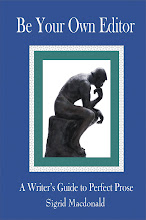Likewise with the word try. Often in the motivational speaking world or New Age movement, people like Wayne Dyer or Tony Robbins advise doing away with the word try altogether. Don't try, just do it! Using poor Ben again, we could rephrase that sentence by saying, "Ben said that he was going to try to write his essay." If it's written that way, we have a mental picture of Ben struggling. It's even worse to say, "Ben said that he was going to try beginning writing his essay," because that's a long sentence that's bogged down by too many words. A cleaner sentence would read, "Ben said he was going to write his essay," or " Ben is writing his essay." We don't always need the word going either.
Be aware of words that slow down your sentences or dilute your meaning. There are definitely times that we want to emphasize someone trying, particularly when that person may fail. Or we want to highlight the fact that someone is beginning something because it's brand-new. But frequently, we can do without those terms.
Buy Be Your Own Editor directly through me by hitting the Contact Me button or sending an e-mail to sigridmac at rogers.com. Or simplifiy your life and get it on PayPal.


